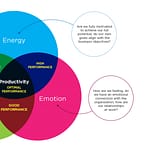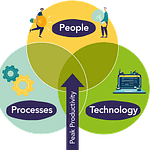#PeopleProductivity@Engage for Success, 15th July 2020
Dr Ann Terry, Engaging Solutions
Two things that are challenging most organisations today are the sense of overwhelm and uncertainty about the future. Both of which are challenging and toxic to the performance of our brain at work. This is at a time when we most need our teams to be able to navigate changes and be agile whilst increasing productivity.
What happens to our brains during overwhelm?
The main thing happening has to do with the prefrontal cortex, the part of our brain just behind our forehead. It is the high performing sports car of our brain. It can do incredible things but is heavy on the fuel required for productive performance and needs careful handling.
In a working day we can manage 4-5 hours of highly focused productive work, after that we will start to noticeably slow up and be at more risk of errors. If you add into the mix multitasking, a requirement of most workplaces, then this figure is dramatically reduced. Our brains do not seem to be able to multitask that well, it is estimated that less than 10% the population can truly multitask.
Typically, in most of us mere mortals, the brain is not really multitasking. What is happening is the brain stops focusing on one task and moves to others, essentially toggling between the two. This swopping is expensive in terms of productively even though it only takes fractions of a second. Various studies have shown that when performing two or more tasks at once, the productively on any one of those ‘jobs’ drops to less than 40 %. When you add in more different tasks the loss of productivity will increase. This could lead to the equivalent of a 70% drop in productivity over a full working day. Signs that this has happened is when you arrive at the end of the day and feel absolutely “brain dead” and wondering “What have I achieved today?”.
Recent research is indicating that this swopping between tasks can also have important impacts on our memory, particularly when we are learning new things e.g. procedures or new software applications. Again, these are things we are all currently navigating as we adapt to new ways of working. Younger brains by and large keep the connection to the first task slightly open. However, in the older person the connection seems to be broken and so it takes longer to reconnect. Thus, may be a greater risk of new learning being lost during multitasking.
And what to do about it
- The major thing is to reduce multitasking, particularly where you are creating content e.g. writing or learning something new. Set the timer for focused sessions, switch off emails, phones and put up an ‘In meeting’ notice.
- Things that can recharge the brain include taking regular breaks and moving your body, rehydrating, softening the focus with some mindful breathing. This only needs to take 5-10 mins and the effect on productivity will be noticeable. When doing novel activities, the brain needs to have breaks after 45 mins of focused concentration. You can leave longer periods between breaks where there is more familiarity with the task.
- Other things that can help at an organisational level are to have meetings that are shorter and pre circulate information. The helps cut down multitasking as people are not trying to understand and assimilate information at the same time as planning action steps.
- Having shorter meetings, online ones is particularly important for brain productivity. Staff at IBM designed a charter which included committing to shortening to 25mins or 50 mins rather than half or full hour ones. This enables people to get clear in their own minds actions they need to take from one meeting, get their thoughts and body recharged for the next one.
Dealing with uncertainty
In the current climate certainty is something that is in short supply. The brain abhors ambiguity, it sees it as a threat. The part that is particularly affected is the high maintenance area, just behind your forehead. Its responsible for complex tasks like collaborating, making decisions and planning. All these tasks are important during times of change.
Uncertainty can result in a reluctance to work with others and see their point of view, a focus on problems and difficulties rather than solutions. You may also notice an increase of blaming others, increase conflict and a rise in procrastination on important tasks.
An alternative that can be used to soothe the brain is clarity, it can be used as a proxy for certainty. Giving people a clear sense of why we are doing a particular action. Sometimes that may be a short-term purpose like getting people back to work safely. Even being clear about what is currently known and unknown can help. Reviewing our individual learning and growth in response to change and challenge can also help create clarity and a felt sense of certainty that the brain appreciates. E.g. What are some of the beneficial changes made over the last few months that we want to hold on to? The importance of positive impact of developing this growth mindset is increasingly being recognised at both an individual and organisational level.
Understanding and developing strategies, practices and cultures that keep employees’ brains as high functioning as possible is being translated into practice by increasing numbers of multinational companies in recent years.
- What habits and practices could you encourage in your workplace to support productive brains?
- What can you do create clarity during uncertain times to further support productive brain functioning?
Dr Ann Terry, Engaging Solutions, ann@engagingsolutions.co.uk




